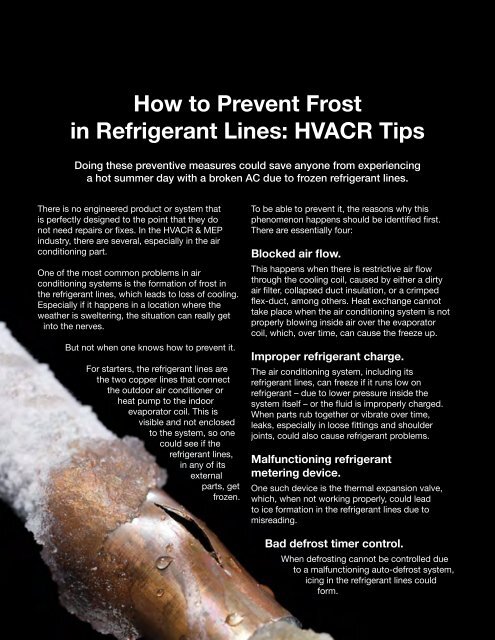HVACR Leaders Magazine: Meet the New President of ASHRAE, Bjarne W. Olesen
GineersNow HVACR Leaders Issue 003. Exclusive: ASHRAE, Gulf O Flex, Rubber World Industries, Faisal Jassim, Gardner Denver, Airfilter, Johnson Controls (JCI), Carrier, Trane, Iceotope, LG chillers, Daikin, Airmaster, Mitsubishi Electric, Panasonic. Special Feature Stories: Heating, Ventilation, Temperature Control, Climate Control, AC, Chillers, Compressors, Controls, Ducts, Heaters, Insulations, MEP, Pumps, Pipes, Refrigeration, Valves. Country Focus: United Arab Emirates, Saudi Arabia, Qatar, Bahrain, Kuwait, Oman, United Kingdom, Singapore, Hong Kong, Philippines, Malaysia, Indonesia, India, Australia. More engineering stories at https://www.gineersnow.com/topics/magazines
GineersNow HVACR Leaders Issue 003.
Exclusive: ASHRAE, Gulf O Flex, Rubber World Industries, Faisal Jassim, Gardner Denver, Airfilter, Johnson Controls (JCI), Carrier, Trane, Iceotope, LG chillers, Daikin, Airmaster, Mitsubishi Electric, Panasonic.
Special Feature Stories: Heating, Ventilation, Temperature Control, Climate Control, AC, Chillers, Compressors, Controls, Ducts, Heaters, Insulations, MEP, Pumps, Pipes, Refrigeration, Valves.
Country Focus: United Arab Emirates, Saudi Arabia, Qatar, Bahrain, Kuwait, Oman, United Kingdom, Singapore, Hong Kong, Philippines, Malaysia, Indonesia, India, Australia.
More engineering stories at https://www.gineersnow.com/topics/magazines
Create successful ePaper yourself
Turn your PDF publications into a flip-book with our unique Google optimized e-Paper software.
How to Prevent Frost<br />
in Refrigerant Lines: <strong>HVACR</strong> Tips<br />
Doing <strong>the</strong>se preventive measures could save anyone from experiencing<br />
a hot summer day with a broken AC due to frozen refrigerant lines.<br />
There is no engineered product or system that<br />
is perfectly designed to <strong>the</strong> point that <strong>the</strong>y do<br />
not need repairs or fixes. In <strong>the</strong> <strong>HVACR</strong> & MEP<br />
industry, <strong>the</strong>re are several, especially in <strong>the</strong> air<br />
conditioning part.<br />
One <strong>of</strong> <strong>the</strong> most common problems in air<br />
conditioning systems is <strong>the</strong> formation <strong>of</strong> frost in<br />
<strong>the</strong> refrigerant lines, which leads to loss <strong>of</strong> cooling.<br />
Especially if it happens in a location where <strong>the</strong><br />
wea<strong>the</strong>r is sweltering, <strong>the</strong> situation can really get<br />
into <strong>the</strong> nerves.<br />
But not when one knows how to prevent it.<br />
For starters, <strong>the</strong> refrigerant lines are<br />
<strong>the</strong> two copper lines that connect<br />
<strong>the</strong> outdoor air conditioner or<br />
heat pump to <strong>the</strong> indoor<br />
evaporator coil. This is<br />
visible and not enclosed<br />
to <strong>the</strong> system, so one<br />
could see if <strong>the</strong><br />
refrigerant lines,<br />
in any <strong>of</strong> its<br />
external<br />
parts, get<br />
frozen.<br />
To be able to prevent it, <strong>the</strong> reasons why this<br />
phenomenon happens should be identified first.<br />
There are essentially four:<br />
Blocked air flow.<br />
This happens when <strong>the</strong>re is restrictive air flow<br />
through <strong>the</strong> cooling coil, caused by ei<strong>the</strong>r a dirty<br />
air filter, collapsed duct insulation, or a crimped<br />
flex-duct, among o<strong>the</strong>rs. Heat exchange cannot<br />
take place when <strong>the</strong> air conditioning system is not<br />
properly blowing inside air over <strong>the</strong> evaporator<br />
coil, which, over time, can cause <strong>the</strong> freeze up.<br />
Improper refrigerant charge.<br />
The air conditioning system, including its<br />
refrigerant lines, can freeze if it runs low on<br />
refrigerant – due to lower pressure inside <strong>the</strong><br />
system itself – or <strong>the</strong> fluid is improperly charged.<br />
When parts rub toge<strong>the</strong>r or vibrate over time,<br />
leaks, especially in loose fittings and shoulder<br />
joints, could also cause refrigerant problems.<br />
Malfunctioning refrigerant<br />
metering device.<br />
One such device is <strong>the</strong> <strong>the</strong>rmal expansion valve,<br />
which, when not working properly, could lead<br />
to ice formation in <strong>the</strong> refrigerant lines due to<br />
misreading.<br />
Bad defrost timer control.<br />
When defrosting cannot be controlled due<br />
to a malfunctioning auto-defrost system,<br />
icing in <strong>the</strong> refrigerant lines could<br />
form.


















